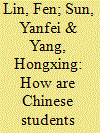|
|
|
Sort Order |
|
|
|
Items / Page
|
|
|
|
|
|
|
| Srl | Item |
| 1 |
ID:
136710


|
|
|
|
|
| Summary/Abstract |
Students have always played an important role in defining the politics of China, and their ideological orientation shapes the nature of student politics. Through a survey of students from six elite universities, this study explores the outlook of Chinese youth’s political identities and analyzes the factors conditioning their identity formation. The results reveal three trends. First, the majority of these college students either claim themselves to be apolitical or to be liberals. Second, among various channels of political (re)socialization, family plays a weak role, while mass media has a strong influence on students’ political orientation. Peking University, the base for nurturing liberals in the 1990s, has now yielded this role to universities specializing in economics and finance, thus suggesting the impact of economic liberalism since the 1990s. Third, gender, education level, academic major, family income, and Communist Party membership are all good indicators of students’ political identities. These results are interpreted in the context of student movements and intellectual transition in China over the past four decades.
|
|
|
|
|
|
|
|
|
|
|
|
|
|
|
|
| 2 |
ID:
137364


|
|
|
|
|
| Summary/Abstract |
Theories that explain post-Mao China's economic success tend to attribute it to one or several ‘successful’ policies or institutions of the Chinese government, or to account for the success from economic perspectives. This article argues that the success of the Chinese economy relies not just on the Chinese state's economic policy but also on its social policies. Moreover, China's economic success does not merely lie in the effectiveness of any single economic or social policy or institution, but also in the state's capacity to make a policy shift when it faces the negative unintended consequences of its earlier policies. The Chinese state is compelled to make policy shifts quickly because performance constitutes the primary base of its legitimacy, and the Chinese state is able to make policy shifts because it enjoys a high level of autonomy inherited from China's past. China's economic development follows no fixed policies and relies on no stable institutions, and there is no ‘China model’ or ‘Beijing consensus’ that can be constructed to explain its success.
|
|
|
|
|
|
|
|
|
|
|
|
|
|
|
|
|
|
|
|
|